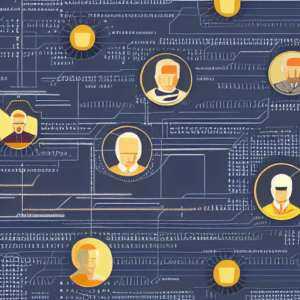In this article, we will compare decentralized autonomous organizations (DAOs) with traditional organizations to determine whether they are a scam or a legitimate governance model.
The Web3 Research Institute is reader-supported. When you buy through links on this site, we may earn a commission at no cost to you.
What Is a DAO?
A DAO is a decentralized organization that uses transparent rules encoded on a distributed ledger. This means that there is no central authority that makes decisions on behalf of the organization. Instead, decisions are made through consensus among the DAO members.
Typically, DAOs are created using blockchain technology and smart contracts. Blockchain is a system that allows for transparent and secure transactions. Smart contracts are self-executing contracts that are stored on the blockchain. They can be used to automate transactions and enforce agreements between parties.
DAOs vs. Traditional Organizations
DAOs differ from traditional organizations in 5 important ways:
1. Type of control
Traditional organizations are centralized, meaning a small group of people control them. In contrast, DAOs are decentralized and a community of users controls them.
2. Level of transparency
DAOs are transparent and automated, which can make them more efficient than traditional centralized organizations.
3. Type of currency
Traditionally, organizations have used government-issued currency. However, DAOs use cryptocurrencies and tokens instead.
4. Governance model
National laws and regulations govern what traditional organizations can do. However, smart contracts dictate how DAOs operate.
5. Physical presence
Most traditional organizations have a physical headquarters, but DAOs exist only online.
Are DAOs Scams?
This is a difficult question to answer. A lot of people think that DAOs are scams because some of them have failed. For example, in 2016, hackers stole $150 million worth of Ethereum from TheDAO, a group that was created to fund Ethereum projects.
However, other people think that DAOs are legitimate and have the potential to change how traditional governance models work.
At this point, it is still too early to say for sure whether DAOs are scams. There are barely any laws or regulations related to DAOs, so they operate in a legal gray area. Policymakers and regulators must get involved for the DAO model to succeed.
But one thing is for sure: DAOs are shaking up the world of business and causing a lot of controversy in the process. So stay tuned and see what happens!
Final Thoughts
Some people think that DAOs are a legitimate way to change how traditional models of governance work. Other people think that DAOs are a scam and will not work. Only time will tell whether DAOs can live up to their potential.
Related Articles

DAO Governance Models and Structures
This article will teach you about the different types of DAO governance models and the key characteristics of DAO governance structures.
